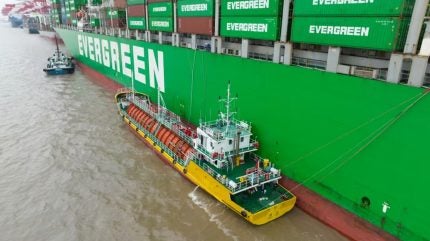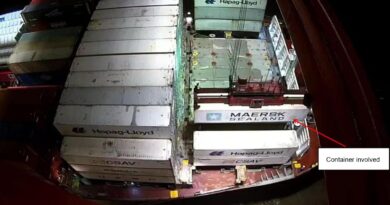SMDERI-QET conducts world’s first ship-to-ship LCO₂ transfer

Shanghai Qiyao Environmental Technology (SMDERI-QET) has completed what is claimed to be world’s first ship-to-ship liquified carbon dioxide (LCO₂) transfer.
SMDERI-QET is a subsidiary of Shanghai Marine Diesel Engine Research Institute-Qiyao Environmental Technology (SMDERI-QET), which is part of China State Shipbuilding Company.
The operation was carried out on 19 June at Yangshan Deep-Water Port in Shanghai and supported by Shanghai Port Group Energy and Shanghai Port Group Logistics.
This transfer demonstrates an end-to-end solution comprising onboard carbon capture, liquefaction, storage, and offloading to carbon utilisation facilities.
SMDERI-QET’s Onboard Carbon Capture and Storage System (OCCS) has achieved more than an 80% capture rate of carbon dioxide with a 99.9% purity level.
Since delivering the first full-process OCCS in early 2024, SMDERI-QET has completed several LCO₂ offloading projects, enabling ship owners to improve their Carbon Intensity Indicator (CII) ratings.
The adoption of OCCS technology has been hindered by the lack of port infrastructure capable of managing large-scale carbon storage and recovery, according to the company.
General Manager of SMDERI-QET, Su Yi, pointed out that many ports lack the necessary systems for efficient ship-to-shore offloading.
“Furthermore, installing the necessary facilities places high requirements on port and terminal infrastructure, which may be limited by draft restrictions and other factors.
“The ship-to-ship LCO₂ transfer project at the Yangshan Deep Water Port not only proves the viability of OCCS it also eliminates the need for terminal facilities for the transfer, storage and recovery of liquified carbon dioxide,” noted Su.
Su highlights that transferring LCO₂ from ship to ship greatly enhances the adaptability of operations, allowing for efficient loading and unloading for ships at terminals that may lack the necessary facilities.
He explains that the LCO₂ that is offloaded can be shipped straight to a facility for storage and use, effectively overcoming a major hurdle for the widespread adoption of carbon capture technology.
He emphasises that this trial is a move towards establishing extensive carbon management solutions within the maritime sector and related fields.
Moving forward, SMDERI-QET aims to collaborate with both domestic and international partners to contribute to the development of regulations and standards for marine carbon capture and transportation.
“We are confident that the completion of the world’s first ship-to-ship LCO₂ transfer, together with the further development of onboard carbon capture technologies, will not only lead to rapid development of a global network of shore-based carbon storage and utilisation facilities, but accelerate the decarbonisation of shipping,” added Su.




